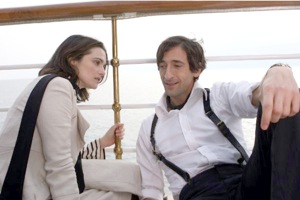arts & entertainment
Movie Reviews
Published Thursday, 21-May-2009 in issue 1117
‘Brothers Bloom’ a blast of con-man comedy
With his 2006 debut Brick, writer-director Rian Johnson had the vision and ambition to make a film noir set at a California high school.
With his follow-up, The Brothers Bloom, he’s made ... well, he’s made a Wes Anderson film, something that’s idiosyncratic enough to qualify as a genre all its own. If Johnson lacks originality here, though, he makes up for it in vibrant energy and visual flair. If he’s copying – or borrowing liberally, to be more charitable – at least he’s made a better Anderson movie than Anderson himself has in about a decade.
Eccentric characters, clever background details, anachronistic wardrobe choices and twee title cards announcing each new chapter – they’re all there, but Johnson’s own complex, verbal voice does emerge from these familiar aesthetic trappings. His con-man comedy is a blast, a romp anchored by strong actors who don’t get many chances to show their funny sides.
Mark Ruffalo and Adrien Brody star as Stephen and Bloom, brothers who bounced between foster homes as children for their various schemes. Now, as adults, they’ve turned those schemes into a lucrative way of life. Stephen, the brains of the operation, draws up the elaborate plans as a means of entertaining his brother, who functions as their star; Bloom, the romantic, inevitably allows himself to get too involved emotionally and now swears he wants out for good.
And so The Brothers Bloom follows that tried-and-true conceit of pulling off one last job which, naturally, becomes way more complicated than anyone could have imagined. Rachel Weisz is completely charming in a never-before-seen way as Penelope, a lonely heiress who starts out as the brothers’ mark but becomes their exuberant partner in crime. The fast-paced montage of hobbies she’s mastered to occupy herself over the years – juggling, unicycling, playing the banjo, making cameras out of watermelons – is a scream, but it also plays like the montage of school clubs Max Fischer belongs to in Anderson’s Rushmore.
The other woman in their posse, Rinko Kikuchi (an Oscar nominee for Babel), is an unexpected scene-stealer, delivering a sly, silent performance as the brothers’ chain-smoking explosives expert, appropriately named Bang Bang. She speaks volumes with just a twinkle in her eye, a bemused smile or whatever gadget she produces, and her presence adds to the controlled lunacy.
Their screwball adventures take them to Greece, Prague, Montenegro, St. Petersburg and the beaches of Mexico. The con itself doesn’t really matter all that much – it has something to do with smuggling a valuable, ancient book, which requires Penelope to put up $1 million – because the key to The Brothers Bloom is the way all these relationships develop. Some of this is predictable, sure: You could see Bloom falling for Penelope before they even meet (and boy, do they meet cute, if you’re into pain). The way she blossoms with him, and them, is still a joy.
Ruffalo and Brody bring weight and a tinge of melancholy to the otherwise frivolous proceedings, though, by wisely underplaying their roles. They tease and torment each other as siblings do, but they also find chemistry in the honesty and heart with which they address each other during serious moments.
With the subtle way The Brothers Bloom develops, it’s enough to make you think we’re the ones being conned after all.
The Brothers Bloom, a Summit Entertainment release, runs 113 minutes. Three stars out of four.
Contrived ‘Management’ is heavy on quirk
It’s easy to forget that Jennifer Aniston truly can act.
It’s easy to get caught up in her sunny looks, in the tabloid frenzy of her off-screen persona, and lose sight of the fact that, when given the opportunity in small, meaty films like The Good Girl and Friends With Money and even the cult comedy Office Space, she can reveal some real substance.
You want that for Aniston in Management, too, but the script from Stephen Belber doesn’t give her enough room to breathe and shine. A playwright and screenwriter (Tape, The Laramie Project) directing for the first time, Belber surprisingly goes heavy on the quirk in this romantic comedy and never develops a romance that feels believable.
Everything about the relationship between Aniston’s Sue Claussen and Steve Zahn’s Mike Cranshaw feels contrived: the way they meet (she’s a guest at the low-budget motel where he’s the night manager), they way they first hook up (she walks into the laundry room and kisses him out of nowhere), the way they fall in love (he crisscrosses the country stalking her until he finally wears her down).
They never make sense as a couple; then again, neither of them is terribly well fleshed-out individually. And that’s a problem when we’re expected to root for them to figure out a life together, despite their baggage and the geographical distance that divides them.
Mike is in a state of arrested development, living and working at the Kingman, Ariz., motel owned by his parents (Fred Ward and an underused Margo Martindale). In his late 30s, he still has a Run-DMC poster on the wall of his room, which is filled with cheap, mismatched furniture. Zahn is often a likable actor, but even he can’t get much going with a character who has so little going for him.
For some reason, though, Mike is smitten by the simple, standoffish Sue from the moment she checks in. A native of Columbia, Md., she’s traveling through town as part of her work selling generic paintings to hang on the walls of generic motels like Mike’s. He finds dumb reasons to talk and awkwardly flirt with her but they never genuinely seem to click. (The moment she gives in and lets him briefly touch her perfect butt is good for a laugh at first, but the more it’s referenced, the more tired it becomes.)
Sue is inexplicably closed off, though; we learn a little bit about her from the charity work she does with the homeless back in Maryland, but otherwise we never understand why she’s so stoic and reluctant to fall in love. And so not only does it seem impetuous and immature when Mike gathers all his cash and flies across the country to be with her, it makes no sense emotionally.
Woody Harrelson livens things up briefly as Sue’s eccentric, once-and-future boyfriend, a punk rocker turned frozen-yogurt mogul who lives in a McMansion in Aberdeen, Wash. (Mike follows Sue there, too. He is persistent.)
But amusing as he is, Harrelson’s character only makes you wonder how a dud like Sue managed to wind up with a wild card like him.
Management, a Samuel Goldwyn Films release, runs 93 minutes. One and a half stars out of four.
|
|
Copyright © 2003-2025 Uptown Publications



